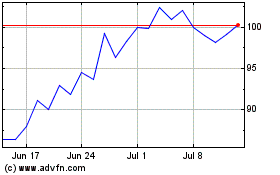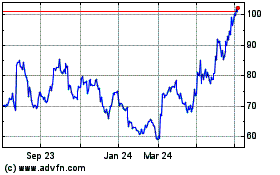2nd UPDATE: Aviva CEO Moss Quits As Investor Rebellion Gathers Pace
May 08 2012 - 9:55AM
Dow Jones News
British insurance group Aviva PLC (AV.LN) unexpectedly said
Tuesday that Chief Executive Officer Andrew Moss would stand down
with immediate effect, the latest U.K. CEO to leave amid investor
anger over pay.
Moss is the third U.K. CEO to stand down in recent weeks as a
shareholder rebellion over the gap between corporate performance
and pay gathers pace. Last week, the chief executives of
AstraZeneca PLC (AZN.LN) and Trinity Mirror PLC (TNI.LN) also quit
after investors challenged their pay.
Moss' departure may appease rebellious shareholders, but it also
leaves a big question mark over the company's immediate future, its
next CEO and its growth strategy, analysts said.
Moss' departure comes shortly after investors in Aviva rejected
the group's remuneration report--and Moss' GBP2.69 million pay
packet--only the fourth time this has happened to a FTSE 100
company, and following a failed attempt by the company to contain
the concerns of investors through a review of its pay policy.
At 1315 GMT, Aviva shares were up 8 pence, or 2.8%, at 311
pence.
Roughly 54% of shareholders opposed the 2011 pay report in a non
binding vote last week, at a time of an increasing and more
vociferous backlash against what many consider excessive executive
pay in the U.K. financial sector.
Aviva said Tuesday that Chairman-Designate John McFarlane would
become interim executive deputy chairman with immediate effect and
executive chairman from July 1, pending the appointment of a new
chief executive.
Aviva's chairman, Colin Sharman, said Tuesday that Moss had
approached him with the decision that he felt it was in the best
interests of the company for him to step aside.
"We should acknowledge the progress that has been achieved under
Andrew Moss' leadership," Sharman said in a statement.
"Through the global financial crisis, he led the consolidation
of our international presence and the integration of 40 brands into
the very powerful single Aviva brand. He reduced the cost base,
improved operational performance and more recently began the
implementation of the strategic focus, with the sale of RAC, the
deconsolidation of Delta Lloyd and a number of overseas
disposals."
Nevertheless, Sharman said that McFarlane would undertake a
review of Aviva's business to make sure it was in the right
business segments and markets.
A spokesman for the company Tuesday declined to provide further
details of the review, and said Moss and other executives weren't
being made available for comment.
Oriel Securities, which rates Aviva buy, said Tuesday that while
Moss' tenure at Aviva had been characterized by "efficiency," he
had failed to galvanize top line growth or boost share price
performance, and that he had at times been regarded by shareholders
as "out of touch."
Shore Capital, which also rates Aviva buy, said that the hiatus
in leadership could leave the group vulnerable to either takeover
or breakup.
Analysts said Aviva would have to hire a new top-quality
successor to Moss sooner rather than later to settle questions
about the company's immediate future.
Some said the potential candidates include current Chief
Financial Officer Pat Regan; Trevor Matthews, who heads the U.K.
operations; as well as Igal Mayer, the well-regarded former head of
European operations, who ironically left the company recently
because of a rejig of top management.
Unite, the U.K. union that represents staff at Aviva across the
U.K. and Ireland, said: "Today's announcement of the departure of
Andrew Moss is a welcome and important step on the road to curbing
greed in the boardrooms of the financial services sector."
Aviva said a week ago that it would review its remuneration
policy and that Moss had turned down a proposed 2012 salary
increase of 4.8%. His 2011 pay packet was up 8.5% from GBP2.47
million in 2010.
Two major shareholder bodies had previously raised concerns
about Aviva's pay.
Pensions & Investment Research Consultants, a shareholder
advisory service, recommended that its members vote against the
remuneration report. The influential Association of British
Insurers, whose members control roughly 12% of the U.K. stock
market and which is supporting the government's proposal to make a
say on pay binding, asked investors to consider carefully their
vote on Aviva executive pay but said it wasn't offering guidance on
how shareholders should vote.
Meanwhile, shareholders in U.K. bookmaker William Hill PLC
(WMH.LN) Tuesday also voiced their concerns over plans to award a
GBP1.2 million retention bonus to CEO Ralph Topping, with just
under 50% voting against the resolution. Topping, who joined
William Hill nearly 40 years ago and became chief executive in
2008, will now receive annual pay in excess of GBP1.7 million and
stay at the company until at least December 2013.
"Whilst we recognize that some shareholders are not supportive
of this one-off agreement, we believe that there is widespread
appreciation of the very significant contribution of Ralph Topping
to the success of William Hill," Chairman Gareth Davis said.
- By Jessica Hodgson; Dow Jones Newswires; +44207 8429373;
jessica.hodgson@dowjones.com.
(Marietta Cauchi contributed to this article.)
Reach (LSE:RCH)
Historical Stock Chart
From Mar 2024 to Apr 2024

Reach (LSE:RCH)
Historical Stock Chart
From Apr 2023 to Apr 2024
